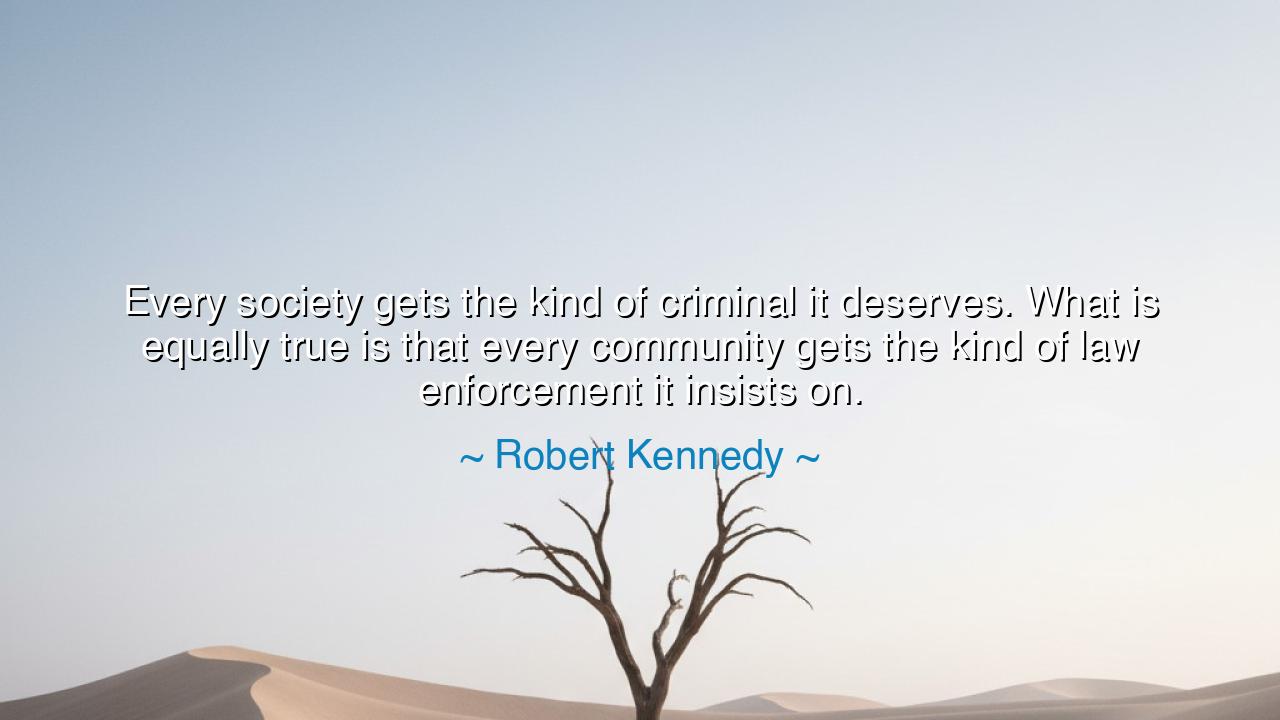
Every society gets the kind of criminal it deserves. What is
Every society gets the kind of criminal it deserves. What is equally true is that every community gets the kind of law enforcement it insists on.






In the great flow of history, society has been shaped not only by the laws it creates but by the very spirit of its people. Robert Kennedy’s words, “Every society gets the kind of criminal it deserves. What is equally true is that every community gets the kind of law enforcement it insists on,” pierce through the illusion of blame, urging us to look not only at the criminals who disrupt our peace, but also at the society’s role in creating and tolerating them. The criminal is often a reflection of the moral fiber of the community that allows his actions to persist, and the law enforcement is the mirror through which society’s justice is delivered. The two are inseparable, and both reveal the moral health of the collective.
The truth in Kennedy’s statement is rooted in the ancient concept of accountability, for it is said in the Greek tradition that a society’s laws must not only punish wrongdoing but also reflect the virtue of the people they govern. In Plato’s Republic, he spoke of the justice of a city and its people, asserting that a society cannot be just unless the moral values of its citizens are upheld through both law and action. If a community is to harbor injustice in its heart—whether through inequality, greed, or prejudice—then it will produce individuals who prey upon the weak, those who disregard the laws in their pursuit of personal gain. Thus, the criminal is not born from a void but from the fertile ground of a society that has allowed moral corruption to fester unchecked.
Consider the fall of Rome, a civilization that once held the ideal of virtue as its highest value. As the empire expanded, the foundations of Roman society began to erode. The rise of corruption and the decline of public virtue led to the proliferation of crime, and those in power turned a blind eye, corrupting the very laws that once upheld the empire. In such a society, criminals—whether petty thieves or emperors bent on tyranny—were a reflection of the weakness within the state itself. The law enforcement of the day was ineffective, and the justice system became a tool for the rich and powerful rather than a mechanism for the common good. Rome’s eventual collapse can, in part, be attributed to its inability to demand justice and to hold its own leaders accountable.
In more recent times, the history of apartheid South Africa offers another striking example of how society shapes both criminals and law enforcement. The laws of apartheid were themselves criminal—designed to enforce racial segregation, inequality, and the subjugation of an entire race. In this society, the criminals were not just those who broke laws but the very system that legislated hatred and oppression. The law enforcement, from the police to the courts, was complicit in this great injustice, carrying out the will of the state rather than upholding universal justice. It was only when the people demanded change—through the courage of leaders like Nelson Mandela and the collective action of the oppressed—that the laws of injustice were finally overthrown, and true justice could begin to take root.
Kennedy’s wisdom shines through in a lesson that transcends time and place: when society tolerates corruption in its values, it will inevitably produce those who exploit the system. When laws are unjust, those who enforce them become complicit in the harm they cause. The community that insists on justice, that demands accountability in both its laws and its law enforcement, creates a system that protects and uplifts all its members. It is not enough to point fingers at the criminals or law enforcement as separate entities; we must look to ourselves, to the values we endorse, and to the systems we allow to function in our name.
The lesson is simple yet profound: the quality of a society—its laws, its morality, and its justice—is a reflection of the conscience of its people. If we allow injustice to take root, if we remain silent in the face of inequality or exploitation, then we, too, become complicit. If we insist on integrity, compassion, and accountability, then we will demand laws that reflect those values and law enforcement that upholds them. Our society will be strengthened, and the cycle of crime and injustice will be broken.
Thus, let us act with intention and clarity. We must demand accountability in all corners of life—not only from those who break the law but from the institutions that uphold it. We must ask ourselves: What kind of society do we wish to create? And the answer lies not in the laws alone, but in our commitment to living with honor, to creating a system where justice serves not the privileged few but all members of the community. This is the path to a society where crime is not tolerated, and where justice is not an ideal but a living, breathing force that touches all lives. Let us strive for that world, where truth and fairness govern not just the courts, but every heart within the community.






AAdministratorAdministrator
Welcome, honored guests. Please leave a comment, we will respond soon